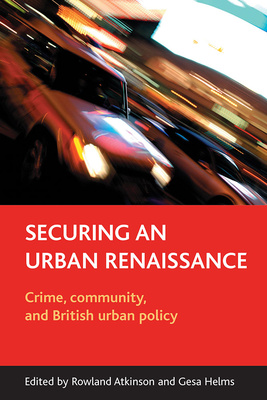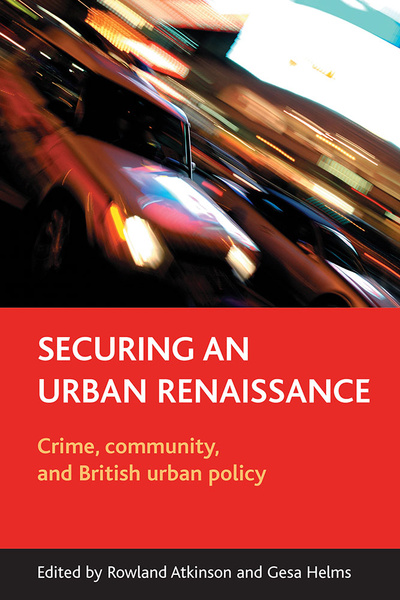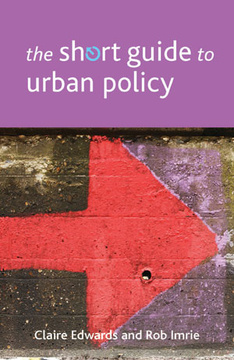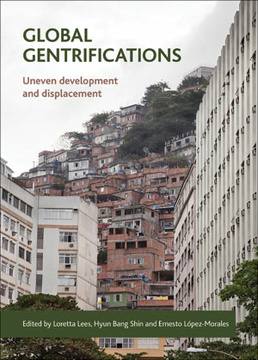Securing an urban renaissance
Crime, community, and British urban policy
Edited by Rowland Atkinson and Gesa Helms
Published
Jul 11, 2007Page count
304 pagesISBN
978-1861348142Dimensions
234 x 156 mmImprint
Policy PressPublished
Jul 11, 2007Page count
304 pagesISBN
978-1861348159Dimensions
234 x 156 mmImprint
Policy PressThis collection adds weight to an emerging argument that suggests that policies in place to make cities better places are inextricably linked to an attempt to civilize, pacify and regulate crime and disorder in urban areas, contributing to a vision of an urban renaissance which is perhaps as much about control as it is about the broader physical and social renewal of our towns and cities.
The book has three key themes: the theories, strategies and assumptions underpinning the securing of 'Urban Renaissance'; the agendas of current urban policy in the field of crime control; and, thirdly, the role of communities within these agendas. The book provides focused discussions and engagement with these issues from a range of scholars who examine policy connections that can be traced between social, urban and crime policy and the wider processes of regeneration in British towns and cities. The book also seeks to develop our understanding of policies, theories and practices surrounding contemporary British urban policy where a move from concerns with 'urban renaissance' to those of sustainable communities clearly intersect with issues of community security, policing and disorder.
Providing a rare disciplinary crossover between urban studies, criminology and community studies, "Securing an Urban Renaissance" will be essential reading for academics and students in criminology, social policy and human geography concerned with the future of British cities and the political debates shaping the regulation of conduct, crime and disorder in these spaces.
"This wide-ranging collection of essays provides a far-sighted analysis of salient themes currently unfurling around British struggles to promote urban safety, orderly communities and place regeneration. Offering a successful blend of theoretically sophisticated and empirically grounded chapters, this is a timely and genuinely interdisciplinary book that deserves a wide-readership among academics and policy makers whose interests overlap in the broad fields of criminal justice, social, urban and public policy." Stuart Lister, University of Leeds
Rowland Atkinson is a Senior Researcher and Director of the Housing and Community Research Unit at the School of Sociology, University of Tasmania. A former research fellow of the Department of Urban Studies, University of Glasgow, his work has focused on issues of neighbourhood change and patterns of social exclusion and privilege in cities including research on gentrification, gated communities, defensive homeownership and informal regulation in affluent and deprived neighbourhoods.
Gesa Helms is a Research Fellow at the Department of Urban Studies, University of Glasgow. Her research interests lie, firstly, in the political economies of urban restructuring, in particular urban governance, economic regeneration, labour markets and social inclusion policies in old-industrial regions. A second strand of research centres on debates around social regulation, policing and surveillance.
Introduction ~ Rowland Atkinson and Gesa Helms; Part I: Theories and concepts: Framing the governance of urban space ~ Kevin Stenson; The planning, design, and governance of sustainable communities in the UK ~ Mike Raco; Is urban regeneration criminogenic? ~ Lynn Hancock; Part II: Policies and agendas: New Labour's 'broken' neighbourhoods: liveability, disorder, and discipline? ~ Craig Johnstone and Gordon MacLeod; Lockdown! Resilience, resurgence, and the stage-set city ~ David Murakami Wood and Jon Coafee; Tackling anti-social behaviour and regenerating neighbourhoods ~ Andrew Millie; 'Problem' people, 'problem' spaces?: New Labour and council estates ~ Charlie Johnston and Gerry Mooney; Part III: Communities in control of (dis)order: Community-police relations: support officers in low-income neighbourhoods ~ Caroline Paskell; New governance of youth disorder: a study of local initiatives ~ John Flint and Hannah Smithson; The night-time economy: exploring tensions between agents of control ~ Gavin JD Smith; Prostitution, gentrification, and the limits of neighbourhood space ~ Phil Hubbard, Rosie Campbell, Maggie O'Neill, Jane Pitcher and Jane Scoular; Urban renaissance and the contested legality of begging in Scotland ~ Joe Hermer and David MacGregor; Conclusion: British urbanism at a crossroads ~ Gesa Helms and Rowland Atkinson.











